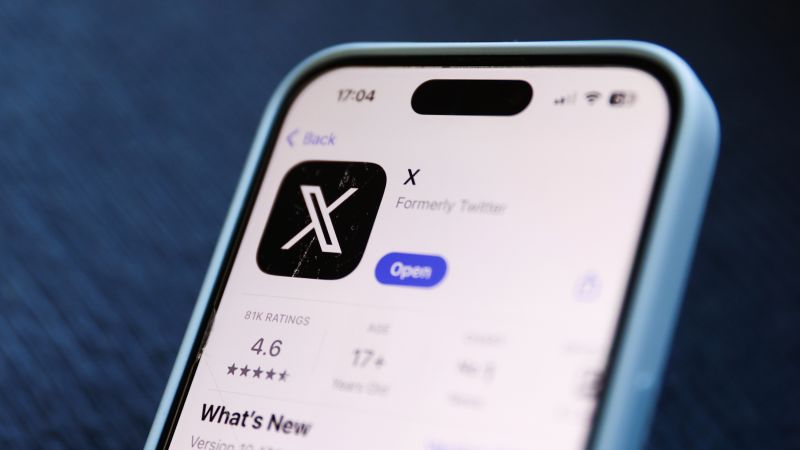In October 2022, Elon Musk made headlines by acquiring Twitter for a staggering $44 billion, a decision widely considered an overpayment at the time. Following the acquisition, Musk implemented a series of sweeping changes that thrust the company into a realm of chaos, adversely impacting both its advertising revenue and overall valuation. Fast-forward two and a half years, and Musk appears poised to achieve a remarkable turnaround. The social media platform, which has been rebranded as “X,” may once again be approaching the valuation Musk initially paid.
Recent reports from Bloomberg shed light on X’s potential rebound, indicating that the company is in discussions to raise funds that could lead to a valuation of $44 billion. Anonymous sources quoted in the Bloomberg article urged caution, noting that the talks could falter, leaving uncertainty over whether X will actually achieve this figure. This speculation dovetails with a significant resurgence in the platform’s fortunes, as major advertisers who had withdrawn their support began to reallocate resources towards X. High-profile brands such as Amazon and Apple, previously wary of the platform due to its associations with hate speech and extremist content, are reportedly investing in campaigns on X once again—a significant endorsement given their wide reach and influence.
The stabilization of X has also proven beneficial for a group of bondholders who had suffered substantial losses on their investments. These bondholders managed to unload billions of dollars in X debt holdings, albeit at a significantly reduced rate of 97 cents on the dollar, though the interest rates involved remained notably high. Additionally, X reportedly maintains a stake in xAI, Musk’s artificial intelligence venture, which is currently pursuing a $75 billion valuation, further strengthening X’s financial position and credibility.
However, the principal catalyst behind X’s remarkable bounce-back appears to be Musk himself. The platform has so far declined to provide comment on its fundraising initiatives or Musk’s involvement with the White House, which seems to play a role in X’s enhanced valuation. Musk’s designation as a special government employee under President Donald Trump has granted him considerable influence within federal operations, perhaps as he seeks to reshape them to align with his vision.
Investors in X seem to be banking more on Musk’s persona than the actual business performance, drawing parallels to Trump Media & Technology Group, which despite limited revenue, boasts a market value exceeding $6 billion, largely due to Trump’s celebrity status. Last year, Musk further aligned X with Trump, using the platform to propel the President’s campaign and disseminate contentious ideologies, often employing inflammatory rhetoric aimed at the Biden administration.
Now, with Trump reinstated in the office and Musk holding sway in the executive branch, X has reemerged as a vital platform for engagement with the administration. Through X, Musk is leveraging his voice to communicate changes within the newly established Department of Government Efficiency, making the platform essential for contemporary news consumption.
Experts like Wedbush analyst Dan Ives suggest that Musk’s strategic choices aligning X with Trump’s presidency could have effectively doubled its valuation. Years of downward trajectory culminated in Fidelity valuing X at merely 20% of what Musk paid just a year prior. Although X has seen improvements in recent months, its worth was still presumably around 30% of the initial valuation last year.
Musk’s transformative actions upon acquiring Twitter included monumental staff layoffs, reinstating banned accounts, and remolding verification processes, all of which fundamentally altered the platform’s landscape. His brash style culminated in expletive-laden rebukes directed at major advertisers like Disney, asserting that those who departed could “go f**k yourself,” a tactic that underscores the turbulence accompanying Musk’s leadership.
Despite the controversies and setbacks, Musk’s stringent cost-cutting measures at X have seemingly bolstered profitability. With the return of high-dollar advertisers, it’s plausible that these decisions are tied to broader initiatives aimed at currying favor with Trump and his coalition. However, the sustainability of this momentum is uncertain, as X faces heightened competition from rival platforms that have emerged since Musk’s acquisition.
Ultimately, Musk’s ability to revive X is both surprising and complex. Despite the platform’s scars from a history of promoting extremism and divisive rhetoric, the trajectory toward recovery showcases a blend of strategic maneuvering, personal brand leverage, and opportunism in an ever-evolving digital landscape. While the immediate outlook may seem optimistic, the long-term success of X will hinge on its capacity to navigate these multifaceted challenges ahead.



